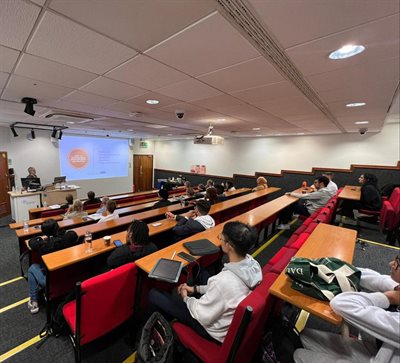Miss Yael Gelfer - Consultant Paediatric Orthopaedic Surgeon, Miss Anna Bridgens - Consultant Paediatric Orthopaedic Surgeon, Dr Sam Thayalan - Consultant Occupational Physician and Professor Duncan Tennant - Consultant Orthopaedic Surgeon presented their ideas on Neurodiversity experiences and observations in medical and surgical training at special event held by St George's Surgical Society.
 Here, Mona Jaffar Karballai and Elzbieta Gureviciute, Co-Presidents of St George's Surgical Society share their thoughts and takeaways from the event:
Here, Mona Jaffar Karballai and Elzbieta Gureviciute, Co-Presidents of St George's Surgical Society share their thoughts and takeaways from the event:
1. Increase Awareness and Reduce Stigma: First and foremost, this event increased our awareness of the wide spectrum of neurological differences and the unique strengths and challenges associated with each condition. From the student feedback, it is evident that visibility – seeing accomplished surgeons talking about their own experiences with neurodiversity is vital. After the event, the students felt empowered and confident to seek support and be more open about their neurodiversity.
2. Creative inclusive environments: The speakers emphasised the importance of creating inclusive environments. With a deeper understanding and appreciation of how to make workplaces, schools, and communities more inclusive for individuals with neurodiverse conditions by talking about it and embracing respect for individuality, checking in with each other and making support accessible.
3. Adopt a Strengths-Based Perspective: Neurodiversity events often highlight the strengths and unique abilities that neurodivergent individuals bring to the table. We were given a new perspective on how these strengths can be harnessed and appreciated in various settings. For example, an individual with ADHD can appreciate information being given in few words and short amount of time, which can foster more productive time management during meetings.
4. Encourage conversations about neurodiversity: The events shed light on the challenges faced by neurodivergent individuals and the support systems needed to help them thrive. The occupational physician provided us with a greater understanding of the importance of accommodations and appropriate resources in and out of university. However, it is clear that there is much to be done when it comes to making our universities and hospitals inclusive spaces for all. The students emphasised how more events such as this are needed – featuring medical professionals at different stages of their career and encouraging conversations around neurodiversity.
5. Network: The neurodiversity event also provided our attendees an opportunity to connect with individuals who are neurodivergent. Advocate for Neurodiverse Inclusive Policies and Practices: the event motivated us to advocate for policies and practices that promote neurodiversity and inclusion at campus. We need to encourage more support from the university – training for tutors and lecturers, mentorship schemes and other tangible practices to improve the wellbeing of all students.
6. Learn about achievements: Many of us found inspiration in the stories and achievements of neurodivergent doctors and surgeons. It can be empowering to see how people have overcome challenges and made significant contributions to various fields.
Overall, organising and attending the neurodiversity event helped us gain a deeper appreciation of the value of diversity in all its forms. In St George’s Surgical Society we are committed to creating a more inclusive space for everyone. Together with our Diversity in Surgery Officer, Rafal, we are committed to putting together events centred around Equality, Diversity and Inclusion.
